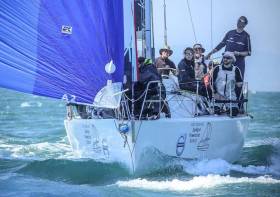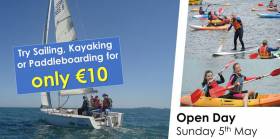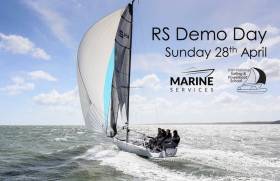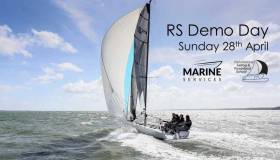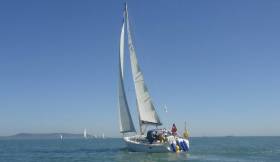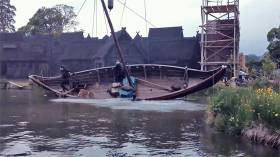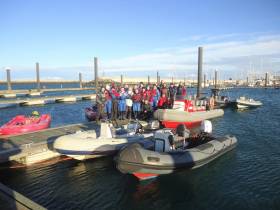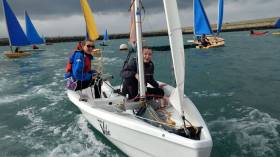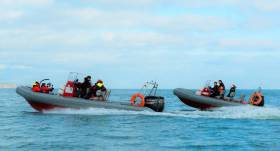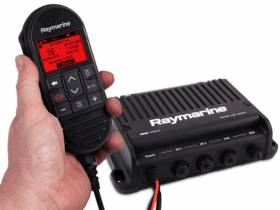Displaying items by tag: INSS
Kenneth Rumball and John White are taking the Irish National Sailing and Powerboat School’s popular ‘man overboard’ lecture to the Royal Ocean Racing Club’s London clubhouse this evening (Thursday 16 May).
On 29 June 2018, the J109 yacht Jedi started the Round Ireland Yacht Race — but little did her crew of eight know that just says later, at 1am on 2 July, crew member John White would be swept overboard south-west of the Blasket Islands.
After well received talks at Wicklow Sailing Club in January and the Royal Irish Yacht Club in February, Rumball and White are in London to tell the story of how Jedi’s crew dealt with the situation — and what lessons were learnt from the incident.
Tonight’s RORC talk from 7pm is free for members and £10 for non-members, with booking available online HERE. For dinner reservations following the presentation email [email protected] or call +44 (0)207 493 2248.
Try Sailing And More At INSS Open Day This Sunday
The Irish National Sailing & Powerboat School is hosting its annual Open Day this Sunday 5 May with opportunities to try sailing, kayaking or paddleboarding for only €10.
Children aged 7 and up and their families can get to grips with the INSS’ fleet of 1720 Sportboats, as well as easy-to-master sit-on-yop kayaks and popular stand-up paddleboards, guided by the school’s experienced instructors.
Waterproof overalls and lifejackets will be provided for sailors, wetsuits and buoyancy aids for kayakers and paddleboarders, and hot showers will be provided after your fun on the water — so all you need to bring is your enthusiasm!
Three times slots are available on the day (10am-12pm, 12.30pm-2.30pm and 3pm-5pm) and booking must be made in advance. For more details see the INSS website HERE.
RS Demo Day At INSS In Dun Laoghaire This Sunday
As previously reported on Afloat.ie, Irish National Marine Services are hosting a demonstration day for the RS Sailing range at the Irish National Sailing & Powerboat School in Dun Laoghaire this Sunday 28 April.
Included in the line-up will be the new RS21 keelboat, with opportunities to get sailing on the exciting design.
There’ll also be a selection of RS Sailing’s training fleet of RS Quests and RS Zests, while a demo RS Aero will be on the water for trials.
Time slots will be managed by the INSS office to ensure everyone gets out on their chosen boat for a test sail of between 60 and 90 minutes. For more details see the Facebook event page HERE.
Full changing and clubhouse facilities will be provided by the INSS ashore, and RS Sailing agent Kenneth Rumball will be afloat to chat about the boats and help out with the demos.
Ahead of the demonstration day, the RS21 will sail to Greystones tomorrow afternoon (Saturday 27 April) to coincide with the RS Easterns at Greystones Sailing Club.
INSS Announce RS Sailing Craft Demo Day
Irish National Marine Services have announced a demonstration day of RS Sailing craft on Sunday 28th April at the Irish National Sailing & Powerboat School in Dun Laoghaire. Included in the line up will be the new RS21 keelboat, with opportunities to get sailing on this exciting design.
There’ll also be a selection of RS Sailing’s training fleet of RS Quests and RS Zests. A demo RS Aero will also be on the water for trials.
"Included in the line up will be the new RS21 keelboat"
The Irish National Sailing & Powerboat School’s office will manage bookings for time slots to ensure everyone gets out on their chosen boat for a test sail of between an hour and an hour and a half. Full changing and clubhouse facilities will be provided by the INSS ashore, and the RS Sailing Agent Kenneth Rumball will be afloat to chat about the boats and help out with the demos.
Irish National Marine Services are looking forward to welcoming all on the 28th of April.
Enquiries about time slots to 01 2844195 or email [email protected]
Attention Yacht Owners – Do You Want to Realise Income From Your Boat When It’s Not in Use?
Since beginning to teach the yachting courses in 2015 the Irish National Sailing & Powerboat School has been inundated with requests to charter their vessels. At first this was met by using the downtime of the school’s two training vessels, however, such is demand for teaching that there is no longer sufficient availability to meet all these requests.
It’s fantastic to see such a healthy growth in demand to get out on the water by more and more people, however, the common trend is that they do not have the time to take on the rigours of ownership. Ultimately, sailing in Ireland requires more boat owners, however, there’s no reason why these owners cannot be financially supported in keeping vessels afloat by those who cannot commit in the same way.
The Irish National Sailing & Powerboat School is looking for boat owners who might consider working in partnership to meet the demands of this new emerging market. All the management of bookings, handovers and cleaning of the vessels would be completed by the school, along with certifying that charters have sufficient training, qualifications and experience to operate the yacht or powerboat.
Speaking about the concept, Chief Instructor Kenneth Rumball is encouraged by the opportunity for the sailing and boat owning community to make getting afloat easier. “While many may view this as facilitating participants to reduce their level of commitment, our experience is that those who are given the opportunity to sail regularly go on, in time, to become owners of their own vessels, both dinghies and yachts. Any formula to increase the number of times someone participates can only help the long-term future of sailing in Ireland”.
You can contact Kenneth Rumball by email, [email protected], or call the school’s office on 01 2844195 for more details and a full breakdown of the proposals.
INSS Looks Back On 2018 With Video ‘Year In Review’
The Irish National Sailing & Powerboat School (INSS) rings in the new year with a video reviewing its action-packed 12 months in 2018.
Highlights of the school’s 40th year include the children’s summer sailing programme, with over 2,800 youngsters taking part, including more than 1,000 primary and secondary school pupils.
2018 also saw the Lula Belle join the INSS fleet as more than 800 adults were introduced to sailing. The powerboat school, meanwhile, had over 300 graduates.
What’s more, Alistair Rumball and team completed their seventh year as marine co-ordinator on the hit US TV series Vikings, which wrapped filming on its sixth season.
The INSS looks forward to changes in the year to come, including its plans to take its school on the road to assist clubs around the country.
INSS Hosts Christmas Holiday Junior Powerboat Course Next Week
Young sailors can make the most of the Christmas holidays with the Irish National Sailing & Powerboat School’s junior club powerboat course.
The two-day course runs next week on Thursday 27 and Friday 28 December from 10am to 5pm each day, and in a special holiday deal the cost has been reduced to €249 per person. Call 01 2844195 for booking details.
It could make the perfect Christmas gift for the sailor or sailors in your family. For other gift ideas, see the INSS’s range of vouchers for all of its sailing and boating courses.
Gonzaga College & Irish National Sailing Club Launch Team Racing Initiative
This year Gonzaga College SJ and the Irish National Sailing Club are launching an initiative to promote team racing in Dublin schools. The event will consist of one day's team racing using the INSC’s fleet of double-handed dinghies. It is open to all Leinster schools and schools can field more than one team. In the long term, it is hoped to build the event into a league and possibly introduce a fleet for younger sailors using RS Feva double-handed dinghies.
The organisers believe there are many benefits to developing the sport of team racing in schools. It improves young sailors skills and knowledge of the racing rules, it promotes another level of friendly competition among schools while allowing boys and girls schools to compete against each other. It prepares young sailors for the very competitive College sailing circuit.
To get this event moving, INSS need your help! The Irish National Sailing Club has through its sister school the Irish National Sailing & Powerboat School has a large fleet of double-handed dinghies along with the relevant rescue craft, committee boats etc. INSS is lacking in experienced team racing management such as committee boat members and more importantly experienced team racing umpires and judges. For this, INSS are looking for your help.
Are you an experienced team racing umpire or race organiser?
Or are you an experienced team racer at any level looking for a fun way to make the transition to becoming a team racing umpire or race organiser?
If so INSS would like to hear from you, please email Fiachra Etchingham [email protected] or Kenneth Rumball [email protected]
The event will be run on January 16 from the INSC clubhouse on the West Pier in Dun Laoghaire Harbour. It is hoped to run a training day before this.
INSS Launch Travelling Sail Training Services for Clubs Around the Country
The Irish National Sailing and Powerboat School will shortly be getting on the road with a travelling sailing and powerboat school to assist clubs right around the country. A programme of sailing and powerboat courses will be available to be delivered within clubs, with all equipment and personnel supplied.
Included in the programmes are powerboat training, VHF, navigation and Sea Survival training as well as a range of sailing programmes. As many may know, the school has been heavily involved in providing marine services to film and television productions in Ireland, most notably the hit TV series “Vikings”. This allowed a build up an extensive fleet of vehicles, trailers and craft that can now be put to use supporting clubs right around the country with additional training opportunities.
"Included in the programmes are powerboat training, VHF, navigation and Sea Survival training as well as sailing"
Speaking about the concept, Chief Instructor Kenneth Rumball says "We’ve been privileged to welcome the wider sailing community to our school in Dun Laoghaire over the past 40 years. Recently we began to think that there would be merit in offering these services to club members at their own club?"
The school has produced a brochure detailing the services on offer and indicative pricing for these. Exact prices will vary depending on the exact services required, however, Kenneth Rumball encourages clubs to get in touch and is happy to discuss individual requirements in detail.
Brochure downloadable below
Last Places Open On Latest VHF Radio Course At INSS
#INSS - Anyone who wants to get certified in the use of short-range VHF marine radio should look to the Irish National Sailing & Powerboat School (INSS) in Dun Laoghaire, which is running its next course from Monday.
The four-evening course taking place next Monday 22, Tuesday 23, Thursday 25 and Friday 26 October (from 6.30pm to 9.30pm each session) will put you hands-on with a real VHF radio rather than a computer-based simulator.
The INSS promises that no more than two people will share a radio at any one stage of the course which, along with the complimentary set of course notes, will equip you to pass the short exam and leave as “a hugely competent user of VHF radio”.
Over the four evenings you will learn the NATO phonetic alphabet, how to conduct day-to-day communications and make emergency or distress calls, and the workings of the GMDSS network and system.
This course is also a prerequisite for many other practical courses, and is a legal requirement for anyone who plans to use a VHF radio set.
Places are still available for next week’s course but dates are also open in the new year in late January, February and March, as well as four other courses scheduled for 2019.


























